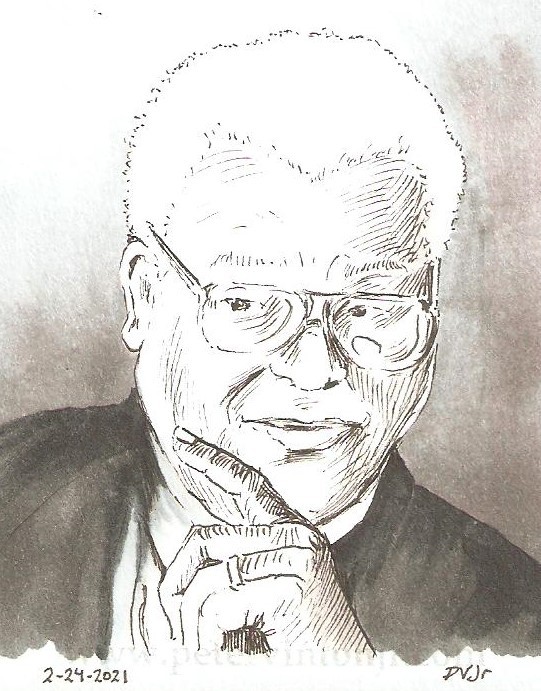
An ongoing illustrative history study
This piece originally posted 4/8/2021
Prelude | 75 | 76 | 77 | 78 | 79 | 80 | 81 | 82 | 83 | Email |
|---|
"Sure, it's been decades since African-Americans had to worry about getting their heads cracked over sitting at a lunch counter, but what about today's workers who still qualify for food stamps? What about people denied justice in a court system stacked against them? Women who don't get to make their own reproductive decisions?"
The life and career of Rev. James Morris Lawson, Jr. is multilayered: born to two generations of ministers in Uniontown, PA in 1928, Lawson himself carried on that family tradition and earned his ministry license in his final year of high school. He then attended Baldwin-Wallace College and became a "conscientious objector" during the Korean War. As a consequence Lawson was sentenced to three years in prison for violation of the draft laws; he later earned his degree from Baldwin-Wallace and then traveled to India to work the Methodist Board of Missionaries. While in India, he studied the Gandhian principles of passive political resistance (satyagraha).
In 1957, Lawson met Dr. Martin Luther King, Jr., who urged him to move to Nashville, TN to help with the burgeoning civil rights movement. Lawson enrolled at the Divinity School of Vanderbilt University, where he served as a director for the Congress of Racial Equality (CORE) and began hosting nonviolence training workshops for the Southern Christian Leadership Conference (SCLC) and for the Student Nonviolent Coordinating Committee (SNCC) --becoming a mentor to many future civil rights leaders; to include James Bevel (see Lesson #58 in this series), Diane Nash (Lesson #52), Bernard Lafayette (look ahead to upcoming Lesson #100), and John Lewis.
Famously, in 1960, Lawson was expelled from Vanderbilt for organizing the Nashville student sit-ins. He moved to Memphis in June 1962 and became pastor of Centenary Methodist Church. On March 3, 1968, while involved in a local sanitation workers strike, Rev. Lawson invited Dr. Martin Luther King, Jr. to Memphis, where Dr. King delivered his now-legendary "I've Been to the Mountaintop" speech --his very last speech before his assassination the following day.
In 1974, James Lawson became pastor of Holman United Methodist Church in Los Angeles, and would continue his social activism for the next 25 years --focusing on Palestinian and immigrant rights; LGBTQ issues; the Iraq wars; and poverty. He retired from that church in 1999; today he serves on the faculty of the California State University Northridge's (CSUN) Civil Discourse and Social Change initiative.
Next page - Lesson 80: Simmie Lee Knox